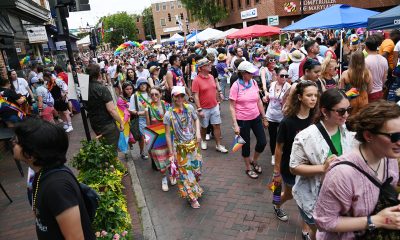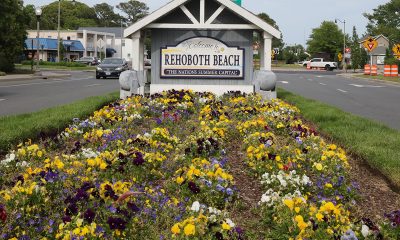Local
The rest of the year’s top local stories
Md. marriage fight, trans shootings dominate headlines

Frank Kameny’s death is our pick for the top local news story of 2011. Here are the rest of the top 10 local news stories of the year.
#2 Md. marriage bill killed, resurrected
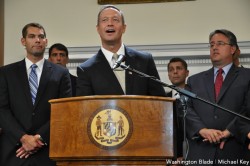
Maryland Gov. Martin O’Malley announced he would sponsor a 2012 bill to legalize same-sex marriage after the measure died in 2011. (Blade photo by Michael Key)
A bill to legalize same-sex marriage in Maryland died in the state legislature in March following a controversial behind-the-scenes decision by supportive lawmakers and leaders of LGBT rights groups to cancel a final vote on the bill on grounds that they lacked enough votes to pass it.
The action to pull the bill took place March 11 when the Maryland House of Delegates approved a motion by voice vote to recommit the bill to committee following an emotional two-and-a-half-hour debate over the measure on the House floor. The withdrawal of the bill came less than a month after the Maryland Senate passed the measure, the Civil Marriage Protection Act, by a vote of 25-21.
A little over a month after the bill’s demise, the board of directors of Equality Maryland, the state LGBT advocacy group that led lobbying efforts for the bill, fired its executive director Morgan Meneses-Sheets. The firing prompted the group’s development director, Matthew Thorn, to resign in protest, worsening the group’s existing financial problems and leading to a major shakeup of the board and staff.
Meanwhile, Maryland Gov. Martin O’Malley, who backed the bill but didn’t aggressively lobby for it, promised later in the year to take a lead role in pushing the measure in the legislature’s 2012 session, which convenes in January. Supporters are hopeful the bill will pass this time around but are uncertain whether it could survive an expected voter referendum.
#3 Rash of anti-trans violence in D.C.
More than a dozen reported violent attacks against transgender women in D.C. in 2011, including two murders, prompted transgender activist Ruby Corado to declare that the transgender community of D.C. was in crisis.
D.C. police, who made arrests in some of the assaults but not for the two murders, said they have no evidence to indicate a single perpetrator is responsible for the attacks.
In August, an unidentified male suspect shot 23-year-old transgender woman Lashai Mclean to death on Dix St., N.E., near the D.C.-Maryland line. Eleven days later a male suspect fired a gun at another transgender woman just a block from where Mclean was killed. The woman was not hit, but police expressed concern that trans women might have been targeted in that area, which is known as a location where transgender prostitutes congregate.
In September, aerospace engineer Gaurav “Gigi” Gopalan, 35, was found dead on a sidewalk in a residential section of the city’s Columbia Heights neighborhood. Most of his friends said he identified as a gay man, but he was dressed in women’s clothes when found unconscious by police, who said the cause of death was blunt force trauma to the head. No suspects have been identified in the case.
The string of attacks and two murders of victims believed to be targeted because of their gender identity prompted at least two protests by trans activists, who called on police to devote more resources to investigate the mostly unsolved cases of anti-trans violence.
#4 Beating of Md. trans woman caught on video

The attack of Chrissy Lee Polis in a Baltimore-area McDonald’s was captured in a video that went viral online. (Blade photo by Michael Key)
The beating of 23-year-old transgender woman Chrissy Lee Polis at a McDonald’s restaurant outside Baltimore in April created a national sensation when a video of the attack went viral over the Internet.
The video, made by a McDonald’s employee, showed two teenage girls punching and kicking Polis as she was sprawled on the floor covering her face and head with her arms. At one point, the video showed one of the female attackers dragging Polis across the floor by her hair.
Polis, who suffered non-life threatening injuries, became a human face for what transgender activists say is the longstanding prejudice, misunderstanding and hate-related violence experienced by the transgender community. Public officials, including Maryland Gov. Martin O’Malley, promised in the wake of the Polis attack to redouble efforts to pass a transgender non-discrimination bill in the Maryland Legislature in 2012.
The two women who attacked Polis, a 19-year-old and a 14-year-old, pleaded guilty to assault and hate crime charges. The 19-year-old was sentenced to five years in prison. Authorities said the 14-year-old was given an undisclosed sentence in the state’s juvenile justice system.
PHOTO: Adam Ebbin
CAPTION: Notoriously anti-gay Virginia elected its first openly gay state senator, Adam Ebbin, who has served in the House of Delegates since 2004.
#5 Adam Ebbin elected first gay Va. state senator
Gay Democrat Adam Ebbin, who has served in the Virginia House of Delegates since 2004, won election in November to the Virginia Senate, becoming the state’s first openly gay senator.
Ebbin defeated Republican challenger and political newcomer Timothy McGhee by a margin of 64 percent to 35 percent. He ran in a district in Northern Virginia with a solid Democratic majority that includes parts of the City of Alexandria and Arlington and Fairfax Counties.
He emerged as an outspoken advocate for LGBT equality during his tenure as the state’s only out gay member of the House of Delegates. He said one of his top priorities in the Senate will be to push legislation to ban job discrimination against state government employees based on their sexual orientation or gender identity.
“I am honored by the trust the voters have shown in me,” Ebbin said following his election to the Senate. “During the campaign I listened to the voters’ concerns and will work on behalf of the values we all share: improving our public schools, expanding our transit system and cleaning up Virginia’s environment.”
#6 Ganymede, D.C. Cowboys, Apex say goodbye
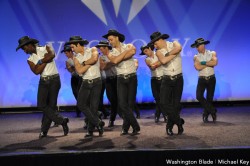
The D.C. Cowboys announced it would disband after 18 years of memorable performances on local, national and even international stages. (Blade photo by Michael Key)
Two popular gay arts and entertainment groups announced plans in 2011 to disband and a third venue, the Dupont Circle gay nightclub Apex, closed its doors for good in July.
Ganymede Arts, D.C.’s only gay-specific theater and arts company, announced in April it was closing after a four-year run that included Broadway-style productions of shows such as “Naked Boys Singing” and “Falsettos.”
Members of the company’s board, including director Jeffrey Johnson, cited financial difficulties as the main reason for their decision to close the company.
“Artistically it’s always been very successful,” Johnson said. “But there’s never been anything left over after each production.”
The D.C. Cowboys, a local dance troupe for gay men, also announced its closing, in this case in 2012, after 18 years of performances at clubs, gay rodeos, and the city’s annual LGBT Pride parade and festival.
The group, which some considered a gay Chippendale troupe geared to country-western music, has been praised for the dance talent of its members who sometimes perform bare-chested.
Apex surprised many of its loyal customers when it closed in July without advance notice. Owner Glen Thompson, who also owns the nearby gay bar Omega, sold Apex to Alan Carroll, the owner of the D.C. gay clubs Ziegfelds-Secrets and the lesbian club Phase One. Carroll said he plans to open a new club in the Apex building at 22nd and P St., N.W., that will cater to a mostly lesbian clientele.
#7 New Md. trans group forms after bill dies
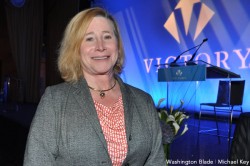
Transgender advocate Dana Beyer co-founded the group Gender Rights Maryland in 2011. (Blade photo by Michael Key)
A transgender non-discrimination bill died in the Maryland Legislature in April after the State Senate startled supporters by voting 27 to 20 to send the Gender Identity Non-Discrimination Act back to committee.
LGBT advocates lobbying for the bill, including officials with the state LGBT group Equality Maryland, said at least seven Democratic senators who promised to vote for the bill changed their positions and indicated they would vote no if the measure came up for a vote.
The Senate action came one month after the House of Delegates voted 86 to 52 to approve a compromise version of the bill that included protections against discrimination in employment and housing but did not include a prohibition against public accommodations discrimination. Supporters of the bill in the House, including its lead sponsor, said they didn’t have the votes needed to pass the bill if it included a public accommodations provision, which would cover public bathrooms and locker rooms in facilities such as health clubs and gyms.
The bill’s demise prompted transgender activists in the state to launch Gender Rights Maryland, the state’s first statewide transgender advocacy organization. Transgender activist Dana Beyer of Montgomery County, one of the group’s co-founders, said Gender Rights Maryland would coordinate efforts to pass a transgender rights bill in the legislature’s 2012 session.
#8 Delaware approves civil unions
The Delaware Legislature in April approved a civil unions bill that provides same-sex couples with all of the rights and benefits of marriage under Delaware law.
The measure cleared the Delaware House of Representatives by a vote of 26-15 and cleared the State Senate by a vote of 13-6. Gov. Jack Markell, a Democrat, signed the bill.
Lisa Goodman, president of the board of Equality Delaware, a statewide LGBT group coordinating lobbying efforts for the bill, said the group and other LGBT organizations and advocates determined they didn’t have the political support in the state to pass a same-sex marriage bill.
Goodman, an attorney, said the civil unions law would provide same-sex couples and their families, including children, with crucial legal protections that they would not have without the civil unions measure.
#9 Local groups celebrate milestones
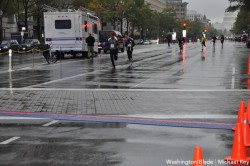
D.C.’s AIDS Walk, organized by Whitman-Walker Health, turned 25 in 2011. (Blade photo by Michael Key)
The D.C. Gay and Lesbian Activists Alliance, the city’s oldest continuously operating LGBT rights group, celebrated its 40th anniversary in 2011.
And Whitman-Walker Health, the city’s largest private clinic treating people with HIV and AIDS, organized its 25th annual Washington AIDS Walk, the group’s main fundraising event.
Nov. 15 marked the 50th anniversary of the founding by the Mattachine Society of Washington, the city’s first gay rights advocacy organization. That milestone became less of a celebration than had been expected due to the death a few weeks earlier of Frank Kameny, the group’s co-founder and leader.
Mattachine Society of Washington ceased operating as an organization in the early 1970s, when Kameny and other leaders of the group shifted their efforts to the then newly formed Gay Activists Alliance, which later became the Gay and Lesbian Activists Alliance. But activists familiar with the city’s gay movement history say Mattachine Society of Washington left an important legacy as a groundbreaking gay advocacy group.
#10 Wone case settlement
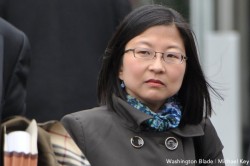
Robert Wone was murdered in 2006. His widow, Kathy Wone, pursued a wrongful death lawsuit against three gay men in connection with the case. (Blade photo by Michael Key)
Three gay men named as defendants in a $20 million wrongful death lawsuit over the 2006 murder of attorney Robert Wone inside their Dupont Circle area townhouse agreed in August to an out-of-court settlement in the case with Wone’s widow, who filed the lawsuit.
A statement released Aug. 3 by attorneys representing Kathy Wone said defendants Joseph Price, Victor Zaborsky, and Dylan Ward “have agreed to a monetary settlement, including payments to the Robert E. Wone Memorial Trust.”
The statement didn’t disclose the amount of money the defendants agreed to pay Mrs. Wone. It said she would use some of the money to advance the causes her husband believed in, including college scholarships and free legal services to people in need.
The three gay defendants were found not-guilty at a criminal trial in which they were charged with obstruction of justice, conspiracy to obstruct justice and evidence tampering in connection with Wone’s murder. Authorities haven’t charged anyone with the murder. D.C. police and the U.S. Attorney’s office say the case remains open and they continue to seek more evidence to charge someone with Wone’s murder.
Price, Zaborsky, and Ward and their attorneys didn’t respond to requests for comment.
Delaware
Historic New Castle to host Pride Market this weekend
Delaware town offers event with more than 55 vendors

The town of New Castle, Del., will host a Pride Market on Sunday, the first day of Pride month.
The event is hosted by the Delaware Sexuality and Gender Collective and features more than 55 LGBTQ-aligned businesses and resources, including Planned Parenthood of Delaware, the ACLU of Delaware, Orgullo Delaware, and New Castle Public Library. The event runs from 12-5 p.m. at 3rd Street and Delaware Street on The Green, an open space and market square.
The inaugural Pride Market in November 2024 was the first market in the town’s history dedicated to the LGBTQ community. The Pride Market is “designed to be an affirming space for LGBTQ businesses and individuals to join together as a community,” according to the Facebook page.
New Castle was founded in the 1650s by Dutch settlers with weekly markets on The Green beginning in 1655. The area features historically significant buildings like the 1732 Court House, the 1799 New Castle Academy, and an 1809 U.S. arsenal. Delaware Pride is scheduled for June 7 in Dover.
Maryland
Annapolis Pride postponed due to weather
Parade and festival will not happen as scheduled, other events to take place
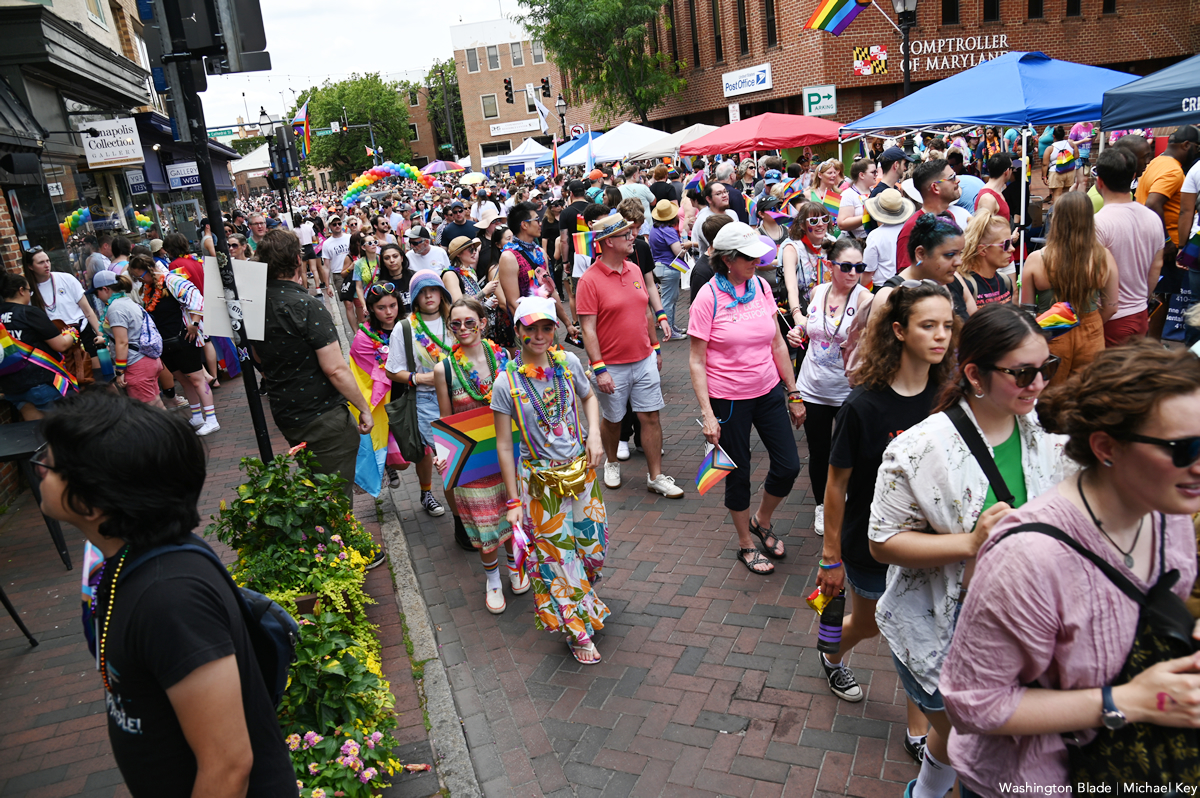
The annual celebration of the Annapolis LGBTQ community has been put on hold due to forecasted severe weather.
The Annapolis Pride parade and festival, both of which were supposed to take place on May 31, have been postponed until a later date.
Annapolis Pride Board Chair Joe Toolan announced the decision this afternoon, citing information given to the Pride board from emergency management agencies and weather forecasting models.
“The safety of our community comes first,” Toolan said. “Based on guidance from the Annapolis Office of Emergency Management and the National Weather Service, we’ve made the difficult decision to postpone the 2025 Annapolis Pride Parade and Festival due to the very real threat of severe thunderstorms, lightning, and flooding.
“We are hoping to reschedule for some time this fall,” he added.
The National Weather Service has issued tornado and flood watches for large portions of the Mid-Atlantic area, more specifically in areas of Virginia, D.C., and Maryland — including Anne Arundel County where Annapolis is located.
The tornado watch only lasts until midnight, but the impacts of heavy downpours in the area can already be seen where the parade and festival were set to take place. The festival grounds at Bates Middle School are already experiencing flooding and over-saturation, and a flood watch remains in effect with more rain forecast for tonight and tomorrow.
“We are all sad and terribly disappointed that we cannot proceed with the parade and festival on Saturday,” Toolan said. “Hundreds of hours have been spent on planning and coordination, and we were expecting tens of thousands of attendees. But at the end of the day, safety concerns outweigh all other concerns.”
Toolan said the Pride board will announce a rescheduled date as soon as it is confirmed.
Even though the Annapolis Pride parade and festival have been postponed, there are a slew of other planned Pride events that will go on as scheduled:
May 30 – Ladies Night – SOLD OUT
6–10 p.m., Eastport Democratic Club, Annapolis
June 1 – Drag Brunch at Leo – SOLD OUT
10 a.m., Leo Annapolis Restaurant, 212 West St.
June 1 – Ecumenical Pride Worship Service
3 p.m., Eastport United Methodist Church, Annapolis
June 3 – Annapolis Pride Beer Launch
4–7 p.m., Forward Brewing, Annapolis
June 5 – Pride on the Pier
6–9 p.m., Bread and Butter Kitchen, Annapolis
June 6 – Big Gay Dance Party
10 p.m.–close, Tsunami Restaurant, 51 West St., Annapolis
June 7 – Pop-Up Market: Benefiting Annapolis Pride
10 a.m.–3 p.m., Annapolis Town Center
Special discounts @Kendra Scott 6/7–6/8
June 14 – Silent Disco
7–11 p.m., Eastport Democratic Club, Annapolis
June 21 – Teen Dance Party
6–9 p.m., Art Farm, Annapolis
For high school freshmen – juniors
*ticketed event
For more information on the postponement of Annapolis Pride, visit https://annapolispride.org/
District of Columbia
Bowser raises Pride flag over Wilson Building
Council members joined mayor to welcome WorldPride to D.C.
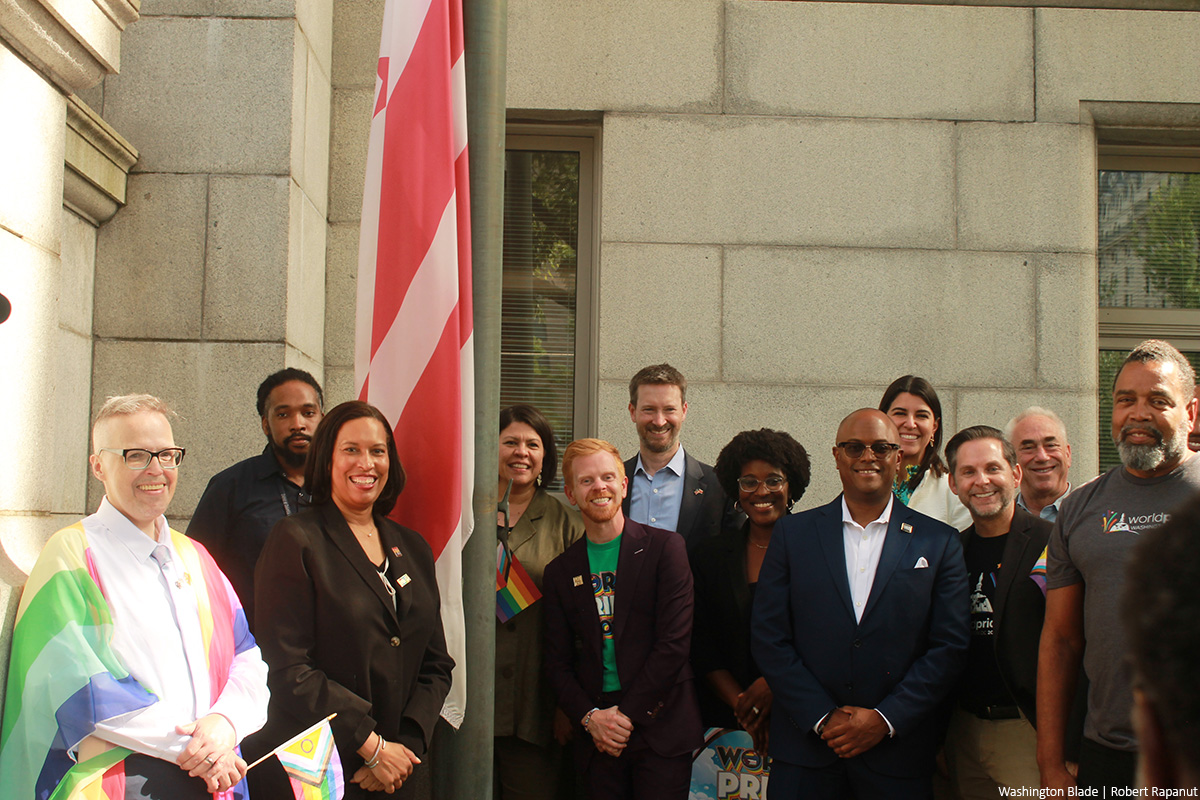
Close to 200 people turned out on Thursday, May 29, to watch D.C. Mayor Muriel Bowser, joined by members of the D.C. Council and officials with the Capital Pride Alliance, raise a large Pride flag on a tall flagpole in front of the John Wilson D.C. City Hall building.
The mayor, who joined others in speaking from a podium on the front steps of the Wilson Building, called the event the city’s official welcoming ceremony for hosting WordPride 2025 DC in the nation’s capital.
World Pride events, which began May 17, continue through June 8.
“Happy WorldPride in the gayest city in America,” Bowser told the crowd to loud cheers and applause.
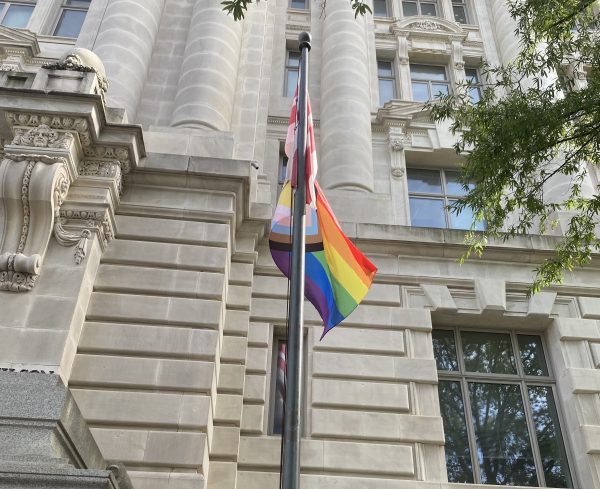
Joining Bowser were five members of the D.C. Council, including gay Council member Zachary Parker (D-Ward 5), who was among the Council members who also spoke at the event.
Also speaking were Ryan Bos, executive director of Capital Pride Alliance, the local LGBTQ group serving as lead organizer of WorldPride 2025, and Capital Pride Alliance Deputy Director June Crenshaw.
“This flag tells a story of love without apology,” Crenshaw said in her remarks at the podium. “Our community has never backed down, and we will not at this time of challenge,” she said.
Japer Bowles, director of the Mayor’s Office of LGBTQ Affairs, told the gathering that the city and especially Bowser and all city officials were proud to host WorldPride at the time of the 50th anniversary of Pride celebrations in D.C.
Among those attending the event and sitting in a front row seat was longtime D.C. gay activist Deacon Maccubbin, who organized the city’s first Gay Pride Day celebration in 1975. He was joined by his husband, Jim Bennett.
During the ceremony Bowser also presented Capital Pride Alliance officials with a mayoral proclamation proclaiming Thursday, May 29, 2025, as “A Day of Remembrance For Bernie Delia in Washington, D.C.” Delia, a longtime Capital Pride Alliance official and one of the lead organizers of WorldPride 2025, died unexpectedly of natural causes June 21, 2024
The other Council members participating in the event in addition to Parker were Brianne Nadeau (D-Ward 1), Brooke Pinto (D-Ward 2), Matthew Ruman (D-Ward 3), and Charles Allen (D-Ward 6)
The Council members, Capital Pride officials, and LGBTQ community members stood next to Bowser as she raised the large Pride flag on a pole located to the right of the front steps and main entrance of the Wilson Building.
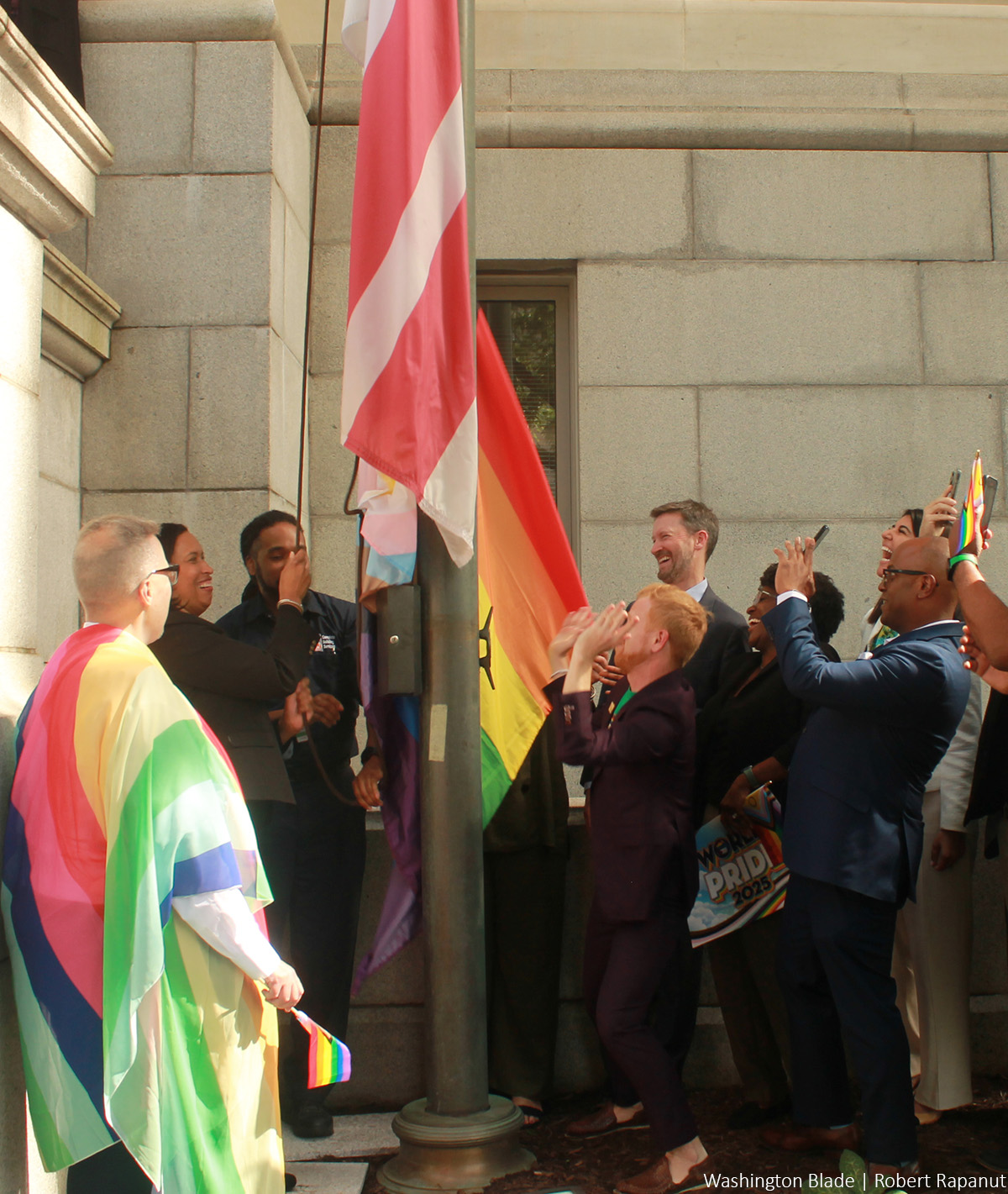
-

 Arts & Entertainment1 day ago
Arts & Entertainment1 day agoShakira cancels WorldPride concert
-

 District of Columbia4 days ago
District of Columbia4 days agoWorldPride hotel bookings hint at disappointing turnout
-

 World Pride 20254 days ago
World Pride 20254 days agoKristine W on WorldPride, drag queens, and being ‘Love Personified’
-

 Movies3 days ago
Movies3 days ago‘Pee-wee’ spills the tea in outstanding new documentary




